- Home
- Anne Stuart
Seen and Not Heard Page 6
Seen and Not Heard Read online
Page 6
Malgreave shook his head. “You’d best watch out if that pretty wife of yours starts buying these things, Josef. It’s been Marie’s only act of revenge for the long hours this job demands. You can tell her state of mind from the food she offers. If she’s feeling generous and forgiving she’ll leave tiny quiches, pastries, even a ragout to heat up. When we were young and just married she’d even wait up for me herself. Nowadays she’s more than likely to reveal her displeasure in frozen fried chicken and peas the size and taste of goat pellets. It’s a sad life, Josef.”
“I’m certain Madame Malgreave loves you very much.”
“Did I say she didn’t?” Louis snapped. “No, you’re right, Josef. But I’ll give you another piece of good advice. There are times when love isn’t enough.” He slammed the freezer door shut. “Back into the cold, my friend. I need to walk.”
And walk they did. Through the empty, windswept streets, they walked and walked until the nagging questions he had began to make sense.
“It was Rocco Guillère,” Malgreave announced abruptly when they’d covered five blocks.
Josef was startled, his ferretlike eyes darting in his egg-shaped head. “What makes you say that? Not that I wish to disagree, Chief Inspector, but there is no proof, no clues, nothing to tie the man to this murder. I agree with you, he must have been responsible for a number of the old ladies, but I can’t see why you suspect him of this one. This was scarcely his area of town.”
“I know.” Malgreave was weary. “I can only go by my instincts, and they seldom fail me. It was Guillère, all right. That elegant old lady in her beautiful apartment had been stabbed by a filthy hoodlum, then laid out on her silk-covered bed like a medieval effigy. God, it makes me sick to look at them. I’d rather there were more blood, signs of a struggle, not that damned formal lying in state, be they a comtesse, a nun, or a cleaning woman.”
Josef shook his head, unconvinced. “It couldn’t have been, sir. We’ve checked with everyone in the building. A man like Rocco would have stuck out like a sore thumb. We showed his photograph to everyone we could find, and not a soul had seen him.”
Malgreave shrugged. “You know what your great strength is, Josef? Your stubbornness and adherence to facts. You know what your great weakness is? The very same traits. We know there are several people in Paris going around murdering old women, and Rocco Guillère is only one of them. Logic tells us that he isn’t the one responsible for last night’s killing. It wasn’t his area of town, and people like him respect territory. A woman like Marcelle Boisrond would never have let a creature like Guillère near her. It stands to reason one of the other killers is responsible.”
“Exactly,” said Josef, not daring to feel smug.
“So when I insist that it was Rocco, despite everything, what will you think?”
Josef didn’t even hesitate. He huddled deeper into the fancy British coat his wife had made him buy. “I’ll know that Rocco did it,” he said flatly.
Malgreave nodded. “Good man. I tell you, Josef, this was one murder too many. We’re going to get him for it, and nothing is going to get in our way.”
And Josef, torn between conflicting emotions, hunched his shoulders against the encroaching wind and followed Malgreave to the corner bistro.
The wind had finally stopped. There was a quarter moon, hung lopsided in a blue black sky, and the bare branches of the trees stretched upward, looking, Claire thought, like desperate arms reaching for rescue.
Morbid fancies, she thought, not turning away from the ghostly landscape. Marc was asleep in the bed behind her, his suitcase was already packed, and in another few hours he’d be gone. She should be back in bed, curled around his warm body, not standing barefoot on icy floors, staring out into the night.
Claire stared down at her clenched fists, deliberately relaxing them, stretching the fingers out. No rings. She’d told Marc tonight that she’d wear one; she’d marry him when he came back from the tour. It was a decision that had needed to be made, and she’d made it. She only wished she’d made the choice somewhere else, over coffee, in a bistro, even walking in that depressing park. It was a choice she would have made sanely, rationally. Why did she feel he’d wrung it out of her in bed that night?
She shivered. Was she simply afraid of commitment? Had she gone directly from a married man to a widower, subconsciously hoping both men would be too involved with their wives, both living and dead, to demand too much from her?
The next month would give her time to sort through her feelings, to decide where neuroses began and ended. And when Marc came back, she would tell him about Brian and the accident.
The Paris moon was a mournful one, she thought, looking upward. For all the talk about lovers and Paris, it wasn’t a romantic sight. It was cold and lonely, shining down over the sleeping city, shining down on the corpses of old ladies, murdered before their time.
Claire shivered again, turning back to the bed. If she were very careful, Marc might sleep through the night. And tomorrow her last few weeks of freedom would begin.
“Tell me about this woman Marc lives with,” Harriette ordered, leaning her frail body back against the chintz sofa and surveying her favorite grandchild with well-disguised fondness. “She’s an American, I gather. Is she loud and vulgar?”
Nicole fiddled with her scratchy wool skirt. “Not really, grand-mère. She’s very quiet and pretty.”
Harriette snorted her disbelief. “Doesn’t sound like she’s Marc’s type. He always went in for flashy blondes while your mother was still alive.”
Nicole didn’t flinch. She had no illusions about Marc—his fights with her mother had been too loud. Harriette had done nothing to foster the relationship, but most responsible for Nicole’s dislike was Marc himself. Nicole had met him when she was four years old and her mother had gaily introduced him as her new father. She’d looked up into those dark, empty eyes of his and for the first time in her young life she’d felt fear. It hadn’t been the last.
“Claire has sort of red blond hair,” Nicole said. “She’s very smart, very nice, really. She tries too hard, but then, what would you expect of an Americaine?”
“Apparently she doesn’t try hard enough. Didn’t you tell me she has no French? Barbaric!” Grand-mère sniffed.
For some reason Nicole found herself defending the woman. “Marc says it’s not her fault. It’s something to do with her brain.”
“Heavens, don’t tell me the woman is a mental deficient!”
“No, no. She tried to explain it to me once, but I wasn’t paying attention,” Nicole said patiently. “She said it was like being partially deaf. She could hear the noises but she couldn’t make out the words.”
“She’s deaf?” Harriette demanded, incensed.
“No, Grand-mère. It’s like she’s deaf, but only when someone speaks in French.”
“How very convenient,” the old woman said icily. “Are you certain you don’t wish to stay here with me while your stepfather is away? You can hardly be comfortable living with an afflicted stranger.”
“I’m more comfortable with Claire than I am with Marc.”
“That isn’t saying much.” Grand-mère picked an imaginary speck of dust from her silk crepe dress. “As long as you’re happy and able to visit me every day I expect we can continue. The moment the woman becomes difficult you let me know, and I will have my lawyers deal with her. I don’t trust Americans.”
“If you met her yourself …”
“I have no need to. You forget, I just spent the last year in California.” The old woman shuddered. “I know just what Mlle. Claire MacIntyre is like without seeing her. I know your stepfather’s taste far too well, and it would take an idiot not to see through him. Therefore, she must be an idiot. Besides, she doesn’t speak French—the interview would be a waste.”
“But you speak English perfectly.”
Madame nodded graciously. “True enough, chérie. But I have no intention of doing so. You’ll simply ha
ve to be the go-between. I imagine we’ll do just fine until your father comes back.” She looked at her granddaughter piercingly, and once more Nicole felt that odd frisson of fear that was becoming far too frequent a companion. “You love your great-aunt Jacqueline, do you not?”
“Of course,” Nicole replied, mystified.
“And California really isn’t that bad. It’s very sunny, and everyone has five color televisions and swimming pools and cars without roofs. You would enjoy yourself.”
“Maybe Marc would let me visit,” Nicole said. “Maybe you could take me.”
Grand-mère smiled, a cool, distant smile that frightened her granddaughter very much. “We’ll see, chérie. We’ll see.”
Gilles Sahut sat alone in his room over the butcher shop, staring out into the bright sunlight as he devoured his noonday meal. He hadn’t taken the trouble to wash the blood from his hands, and the bread and cheese tasted of freshly slaughtered lamb.
He felt restless, angry, ready to jump, and the smell of blood and death from the animals below only increased his edginess. He shoved the heel of bread into his mouth and stomped over to the window, glaring into the bright spring day. He would have to buy a newspaper. Usually he didn’t bother—he could scarcely read and seldom found it worth the trouble.
When the old women started dying he used to buy the paper, spending painstaking hours deciphering the details just to be certain. When he’d taken up his part he continued to read, curious whether anyone linked him with the deaths.
Of course no one had any idea. And they never would. Gilles knew that the truth defied belief—no one would guess and if they did they would dismiss it as impossible. They were safe, all of them.
No, he didn’t need to buy a paper to see if anything new had come from the latest murder. What he needed, quite desperately, was a weather prediction. What he needed, quite desperately, was more rain.
* * *
Claire sat alone in the kitchen of the huge old apartment, delicate hands cradling the mug of coffee. Marc was gone, promising to call every few nights. She hated answering the telephone. Most of the time it was someone babbling at her in French, talking too fast and too loud, never giving her a chance for her halting explanations.
As often as she could she had Nicole answer the phone. But arrangements had been made for Nicole to spend each day with her grandmother, being transported by the old woman’s chauffeur. There was no need for Claire to present herself to Harriette Langlois—that much had been made clear. And indeed, Claire had no wish to subject herself to the humiliation of trying to converse with someone Marc stigmatized as an old harridan, with a reluctant Nicole as translator.
No, she was happy to have her days free, and if part of that freedom meant she was lonely, she would learn to deal with it. She would have Nicole write something in French to leave by the phone, something she could read to whomever was trying to communicate without listening.
She shoved the coffee away. The day stretched ahead of her, bright and clear and shining, with no duties, no responsibilities. She could even leave the dishes sitting in the sink without fear of reprisals.
All she had to do was relax and enjoy herself. She had every intention of doing so when the telephone rang, its shrill bell racing across her nerve endings.
She sat at the table letting brief fantasies play across her mind. It was the man from the park—he’d somehow found out who she was. It was Marc—he couldn’t bear to be away from her. It was Nicole—no, it was her grandmother, and Nicole was hurt.
She couldn’t ignore the telephone. Slowly she rose from the table, crossing the room with dragging feet. Without Marc around she went barefoot, not minding the chill in exchange for the blessed feeling of freedom. The ring was angry, insistent, and Claire held her breath for a long moment before snatching it from its cradle.
Hello was a universal word. The voice on the other end spoke English, and she wished it hadn’t.
“Ms. MacIntyre?” The voice had flat American vowels. “This is James Donner at the United States embassy. We’d like you to come in and answer a few questions for us.”
And Claire dropped the phone from nerveless fingers, watching it clatter to the floor.
CHAPTER 6
Paris was blessed with six sunny days in a row, a miraculous phenomenon after the ceaseless rain. Someone, Nicole perhaps, had told Claire that the old women had only been murdered on rainy days. That knowledge, coupled with the relief from various different sources, was enough to send her into a mood of almost lightheaded happiness, one Nicole tolerated with cynical patience.
Claire hadn’t asked the man from the embassy a thing when she’d retrieved the telephone from the floor, except, “What time would be convenient for you?” Her voice had been wooden, lifeless, a martyr heading for the stake, but James Donner had noticed nothing.
“At your convenience, Ms. MacIntyre,” he’d replied, and Claire had almost laughed into the telephone. There was no convenient time for the conversation she’d been dreading for the last six months, but part of her had been relieved it was over with. They’d send her back to the States, of course. She’d probably be charged as an accessory, or something. She’d have to see Brian again, something she dreaded. But the worst part of all would be to leave Nicole, sullen, prickly Nicole.
And Marc, she amended swiftly. Of course leaving Marc would be the worst. Would he forgive her for not telling him?
Three hours later Claire stepped outside the U.S. embassy, relief, irritation, and confusion all warring for control. It had been nothing, a minor bureaucratic hassle that took only a moment to clear up. She hadn’t applied for her residence permit, something all foreigners were required to do after they’d been in Paris for three months. For some reason Marc hadn’t mentioned it to her, but the workings of the French government were extremely efficient, tracking her down and ready to extend a sharp reprimand.
James Donner, a Southern aristocrat of indeterminate age and sexual preference, took care of it all with bland charm, dismissing her into the Paris streets and the prospect of another harrowing taxi ride, and Claire, dizzy with relief, couldn’t stop herself from asking one question.
“Is there anything else?” Marc had told her the American police were looking for her, that they’d been in touch with the embassy. The police would have no interest in a French residence permit; it had to be something else. Unless Marc lied, and he’d have no reason to do so.
“Nothing for now,” Donner had said with practiced political charm. “If we need you we know where to find you.”
For a moment the words rang ominously in her head. And then she dismissed them as she headed out into the bright, chilly sunshine. Marc must have misunderstood, though that was unlike him. He was such a perfectionist that he seldom made mistakes, and his command of English was almost that of a native.
It must have been some inept employee of the embassy, getting the messages garbled, and Claire’s understandable paranoia had done the rest. She’d suffered three days of panic, all for nothing. Deliberately she shut off the little voice in her head, the one that told her she deserved all the panic and guilt she got. She would celebrate.
During the taxi ride to the embassy she had recognized an area of wonderful shops only a brisk walk northward, shops where obsequious employees spoke a dozen languages, English among them. She would go and buy herself something—perhaps a new silk dress or a clinging nightgown for when Marc returned. Or maybe, just maybe, she’d find a shop specializing in comfortable jeans and running suits and wear only what she wanted until Marc returned. Maybe she’d even find a pair of jeans for Nicole.
The sky was very blue—the brisk winds of Sunday had blown the pollution over to England where the Parisians no doubt felt it belonged. Puffy white clouds were scudding through the heavens, and Claire could smell the wet damp smell of newly awakening earth, even in the midst of the city. For the first time in longer than she could remember, she was happy. Surely nothing terrible could happe
n in such a beautiful world as this.
Chief Inspector Malgreave sat at his desk, pushing papers around. The weather report called for days of sunshine—no rain in sight. There would be no more murders, for a few days at least, and that would give them time. Time to find where Rocco Guillère was the night Marcelle Boisrond was murdered, time to follow up on other leads. There were too damned many of them. Too many leads, and Malgreave’s intellect told him there couldn’t be so many murderers.
His instincts told him there could be.
Thirty-nine files spread out over his desk, some fat, some thin. All elderly women who’d been neatly stabbed in the heart and then laid out like medieval corpses. There were photographs in each file, photographs Malgreave knew by heart. They were all starting to blur in his mind, all the old ones, and he was beginning to forget important details. Were the fingerprints found at the nun’s body or with the twins in La Défense? Had the Comtesse de Tourney been the one who’d been sexually molested after her death, or was it Marthe Hubert?
He pushed away from the desk, running a weary hand through his thinning hair. Somewhere there was an answer, something he was overlooking. He would start again, read through the reports one by one, stare at the gory photos with a jaundiced eye, memorize each insignificant detail until it all began to coalesce and make sense.
Josef came in several times during the long afternoon, bothering him with questions, distracting him with his reverent silence. Someone brought in fresh coffee, stale brioches; someone, probably not the disapproving Josef, replaced his empty pack of cigarettes with a fresh box. The dank room was blue with smoke, a layer of oil had formed on Malgreave’s half-drunk cup of black coffee, and at six forty-seven he sat back, dropped his half-smoked cigarette into the cold coffee, and sighed.
Josef was still there, sitting patiently by the door. “I called your wife,” he said. “I told her you were delayed.”

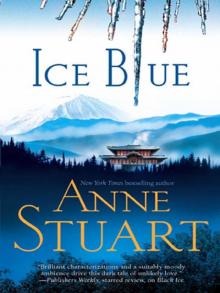 Ice Blue
Ice Blue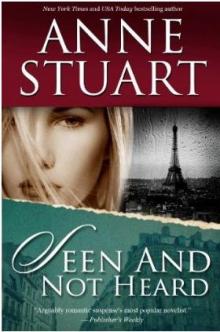 Seen and Not Heard
Seen and Not Heard Never Marry a Viscount
Never Marry a Viscount Heartless
Heartless The Devil's Waltz
The Devil's Waltz Hidden Honor
Hidden Honor Silver Falls
Silver Falls Fire and Ice
Fire and Ice Nightfall
Nightfall Never Trust a Pirate
Never Trust a Pirate The Soldier and the Baby
The Soldier and the Baby Still Lake
Still Lake Reckless
Reckless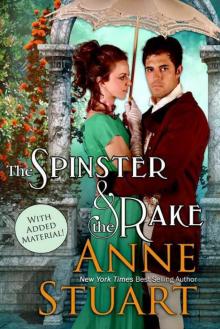 The Spinster and the Rake
The Spinster and the Rake Winter's Edge
Winter's Edge At the Edge of the Sun
At the Edge of the Sun Into the Fire
Into the Fire Night of the Phantom
Night of the Phantom Ritual Sins
Ritual Sins Darkness Before the Dawn
Darkness Before the Dawn Against the Wind
Against the Wind Ruthless
Ruthless The Catspaw Collection
The Catspaw Collection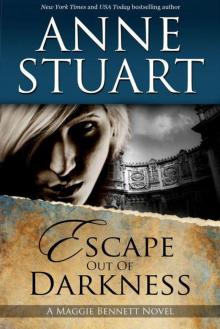 Escape Out of Darkness
Escape Out of Darkness The Widow
The Widow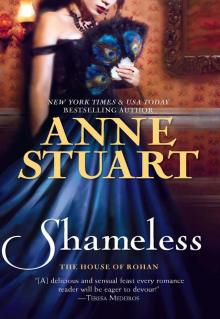 Shameless
Shameless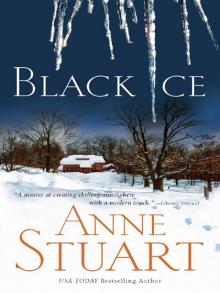 Black Ice
Black Ice Breathless
Breathless Shadows at Sunset
Shadows at Sunset Falling Angel
Falling Angel Housebound
Housebound Cold as Ice
Cold as Ice The Wicked House of Rohan
The Wicked House of Rohan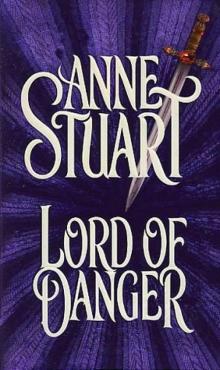 Lord of Danger
Lord of Danger The High Sheriff of Huntingdon
The High Sheriff of Huntingdon Wildfire
Wildfire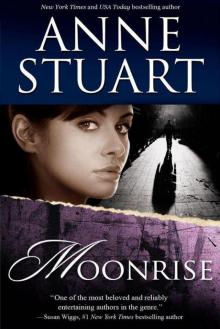 Moonrise
Moonrise The Demon Count's Daughter
The Demon Count's Daughter Date With a Devil
Date With a Devil To Love a Dark Lord
To Love a Dark Lord Driven by Fire
Driven by Fire Special Gifts
Special Gifts Ice Storm
Ice Storm Shadow Lover
Shadow Lover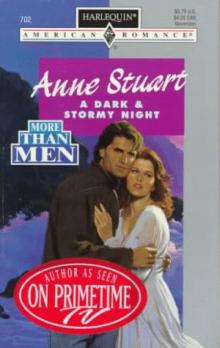 A Dark & Stormy Night
A Dark & Stormy Night Now You See Him...
Now You See Him... Lady Fortune
Lady Fortune Glass Houses
Glass Houses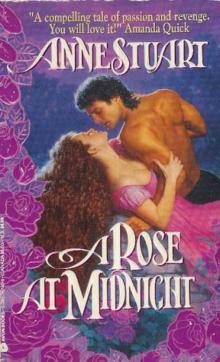 A Rose at Midnight
A Rose at Midnight Prince of Swords
Prince of Swords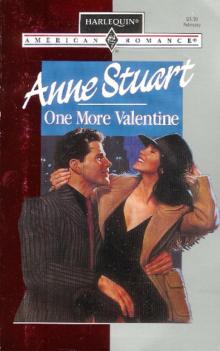 One More Valentine
One More Valentine Return to Christmas
Return to Christmas Tangled Lies
Tangled Lies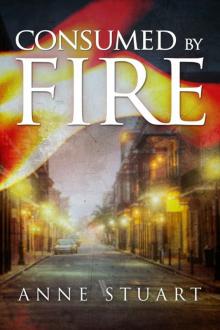 Consumed by Fire
Consumed by Fire The Fall of Maggie Brown
The Fall of Maggie Brown Wild Thing
Wild Thing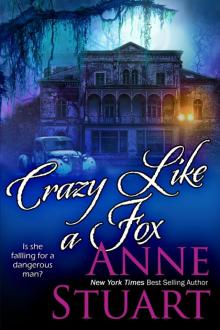 Crazy Like a Fox
Crazy Like a Fox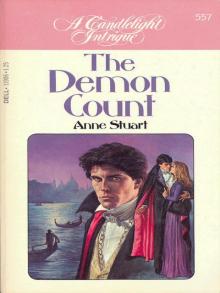 The Demon Count
The Demon Count Prince of Magic
Prince of Magic Wildfire (The Fire Series Book 3)
Wildfire (The Fire Series Book 3)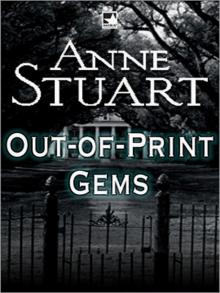 Anne Stuart's Out-of-Print Gems
Anne Stuart's Out-of-Print Gems Shadow Dance
Shadow Dance Under an Enchantment: A Novella
Under an Enchantment: A Novella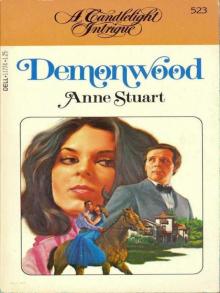 Demonwood
Demonwood Blue Sage (Anne Stuart's Greatest Hits Book 3)
Blue Sage (Anne Stuart's Greatest Hits Book 3)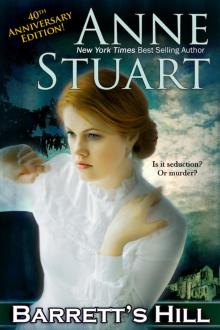 Barrett's Hill
Barrett's Hill Angel's Wings (Anne Stuart's Bad Boys Book 5)
Angel's Wings (Anne Stuart's Bad Boys Book 5) Darkness Before Dawn
Darkness Before Dawn The Right Man
The Right Man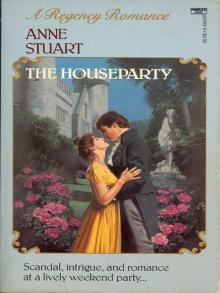 The Houseparty
The Houseparty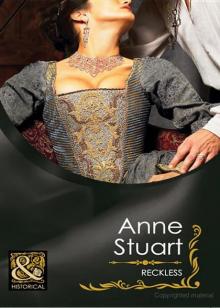 Reckless_Mills & Boon Historical
Reckless_Mills & Boon Historical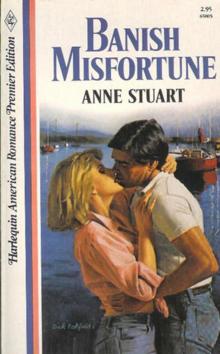 Banish Misfortune
Banish Misfortune Angel's Wings
Angel's Wings Chain of Love
Chain of Love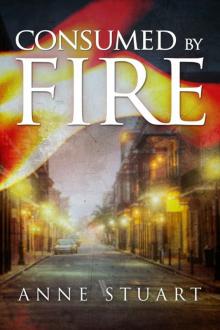 Consumed by Fire (The Fire Series)
Consumed by Fire (The Fire Series)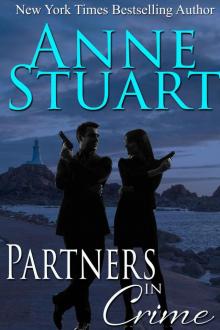 Partners in Crime (Anne Stuart's Bad Boys Book 4)
Partners in Crime (Anne Stuart's Bad Boys Book 4) The Soldier, The Nun and The Baby (Anne Stuart's Greatest Hits Book 2)
The Soldier, The Nun and The Baby (Anne Stuart's Greatest Hits Book 2)